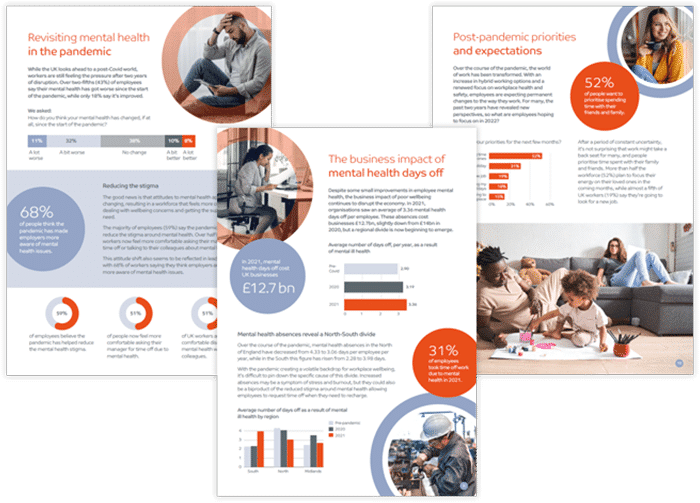Over the course of the pandemic the world of work has been transformed. With an increase in hybrid working options and a renewed focus on workplace health and safety, employees are expecting permanent changes to the way they work. For many, the past two years have revealed new perspectives, so what are employees hoping to focus on the coming months?
In our latest report, mental health days off are increasing – especially in the South of England – people are now looking to balance the stress after a long period of uncertainty.
How are employee priorities changing?
After a period of constant change, it’s not surprising that work might take a back seat for many, as people prioritise spending time with their family and friends. More than half the workforce (52%) plan to focus their energy on their loved ones in the coming months, while almost a fifth of UK workers (19%) say they’re going to look for a new job.
We asked:
What are your priorities for the next few months?

Only 15% of employees are focused on returning to the workplace, compared to 31% who are prioritising taking a break in the form of a holiday. During the pandemic many will have found their time with friends and family has been inconsistent at best, and people are now looking to rebuild our social lives in the new normal. While this attitude shift may be most pronounced in the immediate future, many will find a permanent change in their mindset, with people more keen than ever to ‘work to live, not live to work’.
What do people need from their employer?
When asked how their employer can support their new priorities, 28% of people said they would like to see long-term changes to the way they work, suggesting employees are focused on better benefits such as flexible or remote working.
We asked:
Which of the following would you like from your employer in the next few months?
- 28% of people want long-term changes to how they work.
- 27% want extra wellbeing support.
- 25% want more mental health support at work.
- 21% want their workplace to be made more Covid secure.
Interestingly, employee expectations differ depending on the size of the company they work for. Those who work for larger organisations (over 250 employees) are the most likely to be looking to change their schedule, with almost a quarter (23%) saying adjusting their working pattern is a priority for them.
Larger businesses may also see an increased demand for wellbeing initiatives, with a third (33%) of employees in this category saying they’d like more support compared to just 19% of those in small businesses (under 50 employees).
How to create a supportive workplace culture
While these trends can give leaders a head start, it is workplace culture that shapes employee attitudes to wellbeing, and each organisation will face its own unique challenges as we emerge from the pandemic.
The first step to improving this culture is to speak to employees and encourage open discussions about wellbeing, including mental health, to understand their needs and expectations. Our free Health and Wellbeing Toolkit and workplace wellbeing solutions help HR leaders transform their wellbeing strategy and influence company culture.
To read more about how workplace wellbeing is changing in the post-Covid workplace, read our latest report: Our Changing Attitudes to Mental Health.
The free 12-page report explores how the past two years have impacted mental health in the workplace and includes further resources to share with leaders and people managers in your organisation.
